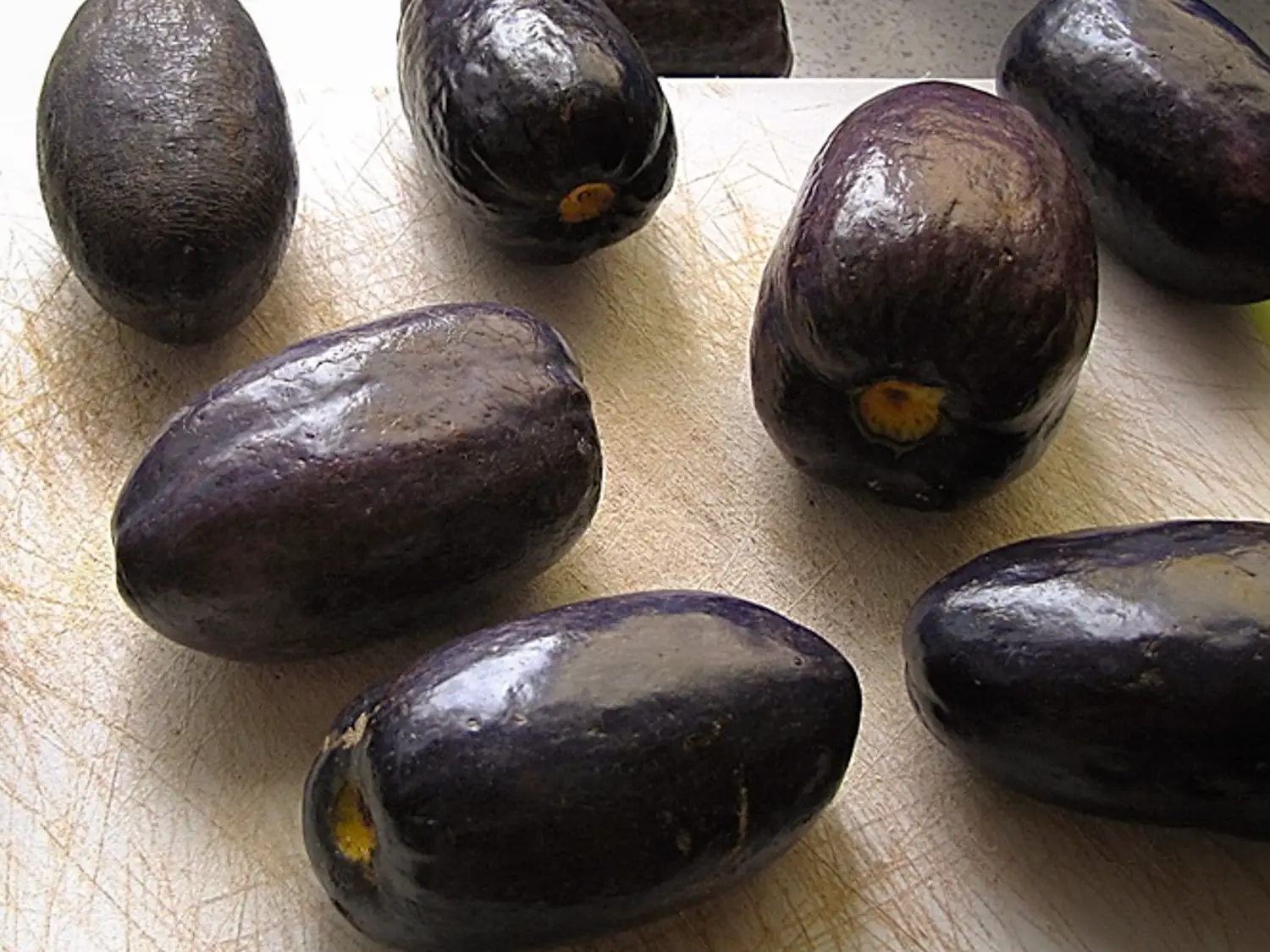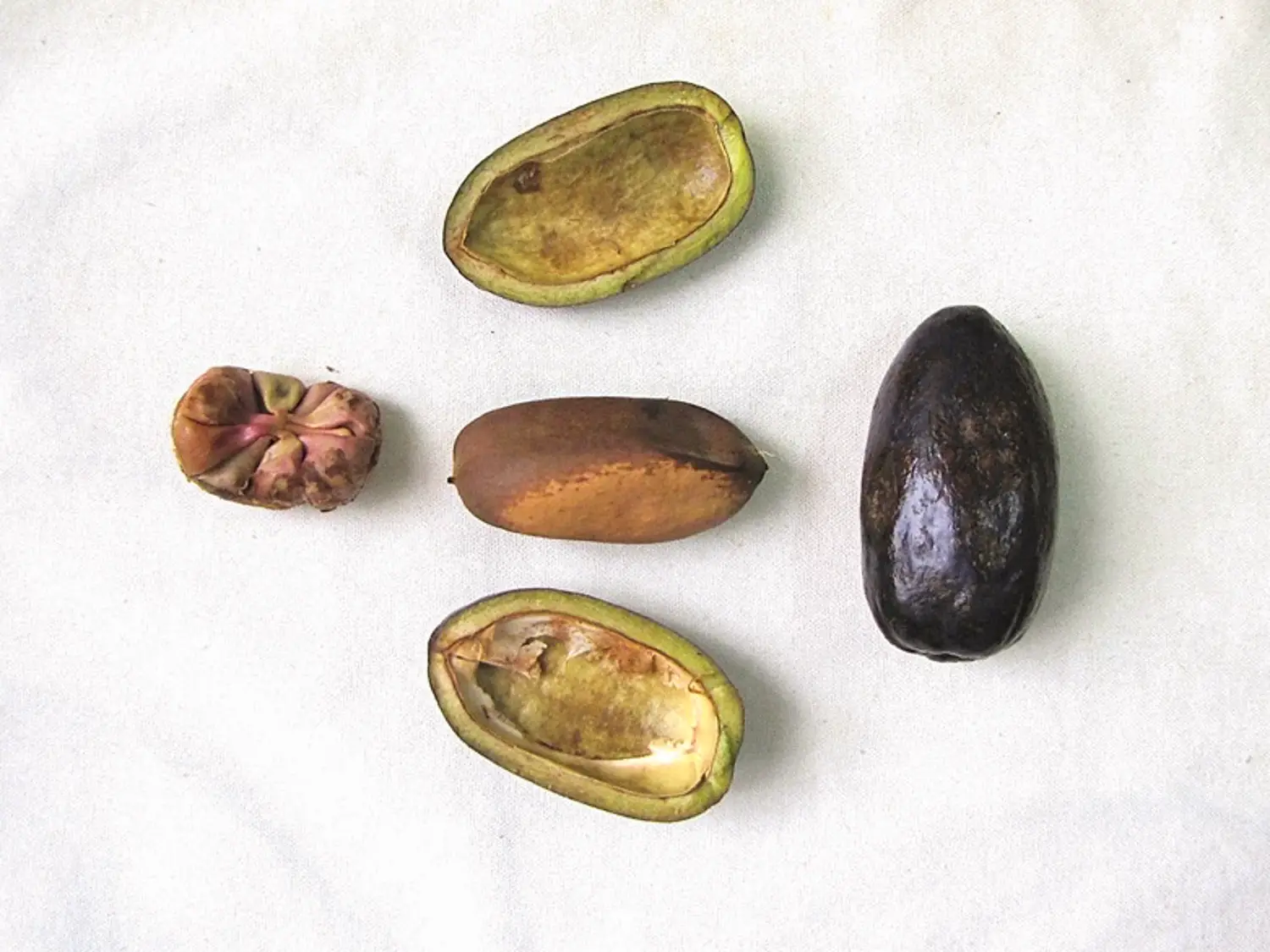As an Amazon Associate I earn from qualifying purchases. Please read the disclaimer for more info.
Introducing African pear, a fruit that is native to West Africa and found mainly in southeast Nigeria. This purple skin fruit is known by many different names, including bush pear, ube, and butter fruit.
It has a pink color when unripe but turns dark purple when ripe. The pulp of the African pear is buttery and has a sweet taste when steamed to a certain temperature.
Other names for African Pear
Native to Africa, the flavorful and nutritious Dacryodes edulis fruit tree is known by many names:
- Safou in Central African countries like Congo or Angola
- Plum in Cameroon and
- Atanga in Equitorial Guinea & Gabon.
- Ube in Nigeria
- As well as bush pear, African plum, nsafu, bush butter tree, and even butter fruit!
That’s a lot of names! More importantly, don’t confuse this fruit with the Filipino Ube.
The Filipino Ube, or purple yam, is a type of sweet potato found mainly in the Philippines. It’s becoming increasingly popular in international cuisine thanks to its unique flavor and vibrant purple hue. With its subtly sweet taste, Ube is often incorporated into desserts such as cakes and ice creams, but it can also add a touch of subtle sweetness to savory dishes like salads and traditional local favorites.


Related: 17 African Cookbooks to Delight in African Cuisine
Health Benefits of African Pears
African pears are nutritious fruit containing various vitamins and essential minerals. It is rich in dietary fiber and Vitamin C, as well as thiamin, riboflavin, and folate. Additionally, this fruit has significant levels of antioxidants and flavonoids that can help protect against certain diseases. Let’s take a look at some more of the health benefits of this native fruit.
1. African Pear is rich in Vitamins and Minerals.
African pear is a good source of vitamins A, C, and E, as well as magnesium, potassium, and calcium. These nutrients are essential for maintaining good health and preventing various diseases.
In particular, Vitamin C is an essential vitamin, meaning your body can’t produce it. Yet, it has many roles and has been linked to impressive health benefits.
Vitamin C is an antioxidant vitamin that our bodies need to thrive. Getting enough in your diet can significantly boost the levels of antioxidants in your blood, which can have a number of positive health benefits.
In particular, it may help reduce the risk of developing certain chronic diseases, such as heart disease, as well as promote healthy bones,
This important vitamin can also promote skin regeneration, an essential part of skin health as a small molecular weight antioxidant and a critical factor for collagen synthesis.
2. Can help boost the immune system.
The vitamins and minerals in African pear can help to boost the immune system, making it easier for the body to fight off infection and disease. Additionally, the antioxidants in African pear can help to protect cells from damage caused by free radicals.
3. Can Help Improve Digestion.
African pear contains fibre, which is beneficial for digestion. Fibre helps to keep the digestive system healthy and promotes a normal bowel movement. Additionally, African pear contains pectin, a type of fibre that has been shown to help lower cholesterol levels.
4. African Pears can Help Promote Weight Loss.
African pear is low in calories and high in fibre, making it an ideal food for those trying to lose weight. Fibre helps to keep you feeling full longer, so you are less likely to overeat. Additionally, the pectin in African pear can help slow down sugar absorption into the bloodstream, preventing spikes in blood sugar levels.
5. Can Help improve heart health.
The fibre and pectin in African pear can help to improve heart health by lowering cholesterol levels and preventing spikes in blood sugar levels. Additionally, the antioxidants in African pear can help to protect cells from damage caused by free radicals
6. Lower High Blood Pressure
Both potassium and vitamin C can have an astonishingly positive impact on reducing high blood pressure. Potassium helps to balance out the sodium in the body, thus reducing strain on the cardiovascular system, while vitamin C encourages increased levels of nitric acid, which aids in widening the blood vessels, allowing for a smoother flow of blood.
7. Other health benefits of the Ube.
It is also reported that the purple flesh of the ube can help treat skin diseases. It is a hypoallergenic fruit, can aid in a healthy pregnancy,
African Pear Tree as Medicine
The African Pear tree is much more than just a beautiful specimen of nature; it is renowned for its usefulness when formulating traditional medicines.
In many African countries, this tree’s leaves, bark, and fruit have been used to treat a wide variety of ailments for centuries.
From dizziness and fever to malaria symptoms, Africans have long composed remedies from decoctions, infusions, and baths made from the different parts of the African Pear tree.
Due to their calming properties, topical applications are also often used as a remedy against skin afflictions such as eczema and psoriasis.
This amazing tree is certainly a source of powerful healing for the human body, which has been treasured by generations in many African nations for hundreds of years.
How to Eat African Pear
Not only is the African pear a delicious and nutritious fruit, but it is also incredibly versatile, with tiny clustered seeds enclosed by the flesh. It can be eaten as a snack or used in various dishes, such as pies and jams. It can also be made into juice or smoothies.
African Pears are often served alongside roasted or cooked corn, with the butter-like flavor perfecting the roasted corn.
African pear has been an important part of West African culture for centuries, and its popularity continues to grow today. With its unique taste and numerous health benefits, it is no wonder why this fruit is gaining more attention.
Conclusion
African Pears are a unique fruit with a buttery taste that is good for human health, with many health benefits such as helping cure some skin diseases, limiting free radical damage, and possibly decreasing the chances of colon cancer through the high fibre content.
Related
- 29 Yellow Fruits: Nature’s Golden Treats
- 19 African Fruits You Need to Try
- Kenyan Food: 28 Traditional Dishes to Try
- 17 Tropical Fruits You Need to Try
- Fruits of Vietnam: A Guide to eating Vietnamese Fruit
- Vietnamese Star Apple
Photo Attribution
T.K. Naliaka, CC BY-SA 4.0 https://creativecommons.org/licenses/by-sa/4.0, via Wikimedia Commons
Bukky658, CC BY-SA 4.0 https://creativecommons.org/licenses/by-sa/4.0, via Wikimedia Commons (altered in Lightroom)


great